Shusen Zhang
Baichuan-Omni-1.5 Technical Report
Jan 26, 2025
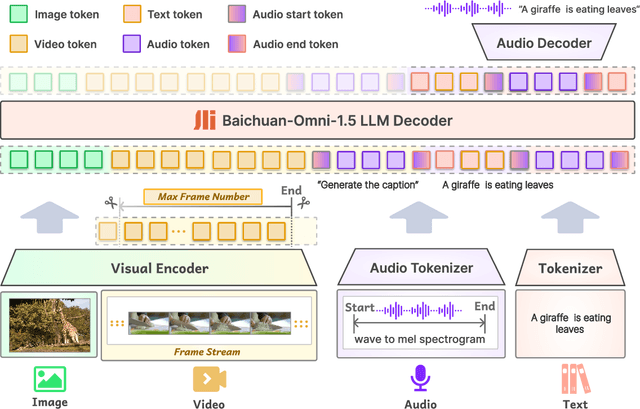
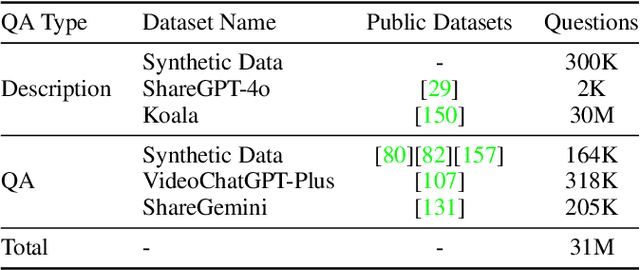
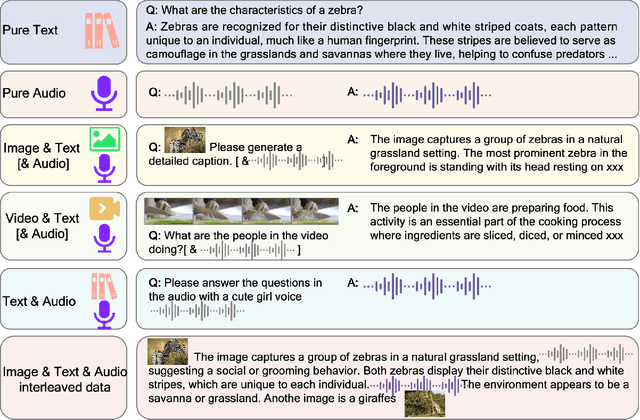
Abstract:We introduce Baichuan-Omni-1.5, an omni-modal model that not only has omni-modal understanding capabilities but also provides end-to-end audio generation capabilities. To achieve fluent and high-quality interaction across modalities without compromising the capabilities of any modality, we prioritized optimizing three key aspects. First, we establish a comprehensive data cleaning and synthesis pipeline for multimodal data, obtaining about 500B high-quality data (text, audio, and vision). Second, an audio-tokenizer (Baichuan-Audio-Tokenizer) has been designed to capture both semantic and acoustic information from audio, enabling seamless integration and enhanced compatibility with MLLM. Lastly, we designed a multi-stage training strategy that progressively integrates multimodal alignment and multitask fine-tuning, ensuring effective synergy across all modalities. Baichuan-Omni-1.5 leads contemporary models (including GPT4o-mini and MiniCPM-o 2.6) in terms of comprehensive omni-modal capabilities. Notably, it achieves results comparable to leading models such as Qwen2-VL-72B across various multimodal medical benchmarks.
Med-R$^2$: Crafting Trustworthy LLM Physicians through Retrieval and Reasoning of Evidence-Based Medicine
Jan 21, 2025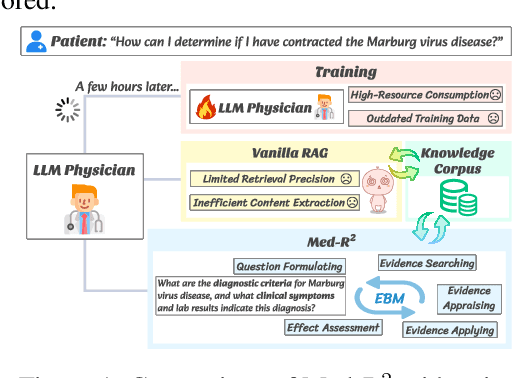
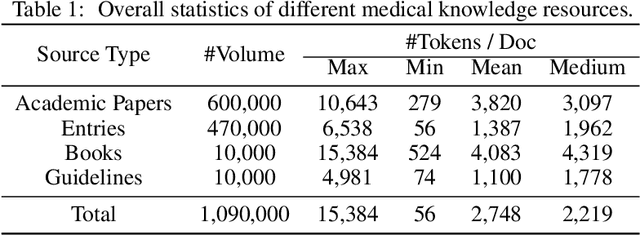
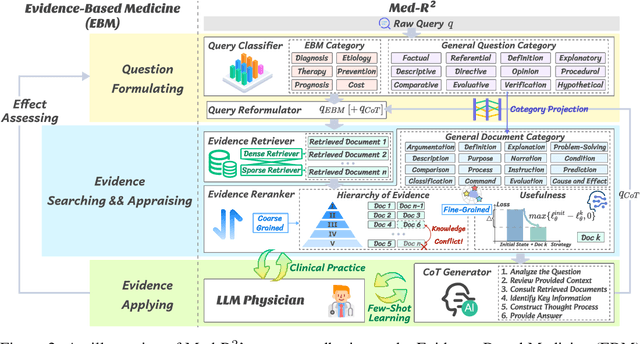
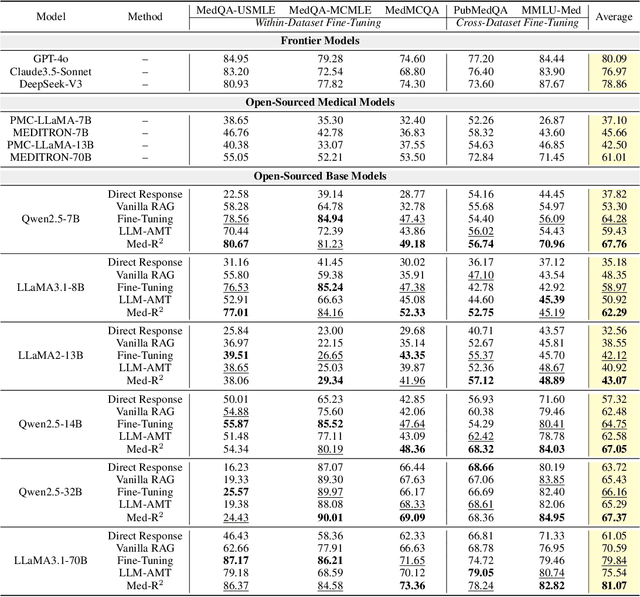
Abstract:In recent years, Large Language Models (LLMs) have exhibited remarkable capabilities in clinical scenarios. However, despite their potential, existing works face challenges when applying LLMs to medical settings. Strategies relying on training with medical datasets are highly cost-intensive and may suffer from outdated training data. Leveraging external knowledge bases is a suitable alternative, yet it faces obstacles such as limited retrieval precision and poor effectiveness in answer extraction. These issues collectively prevent LLMs from demonstrating the expected level of proficiency in mastering medical expertise. To address these challenges, we introduce Med-R^2, a novel LLM physician framework that adheres to the Evidence-Based Medicine (EBM) process, efficiently integrating retrieval mechanisms as well as the selection and reasoning processes of evidence, thereby enhancing the problem-solving capabilities of LLMs in healthcare scenarios and fostering a trustworthy LLM physician. Our comprehensive experiments indicate that Med-R^2 achieves a 14.87\% improvement over vanilla RAG methods and even a 3.59\% enhancement compared to fine-tuning strategies, without incurring additional training costs.
VersaTune: An Efficient Data Composition Framework for Training Multi-Capability LLMs
Dec 02, 2024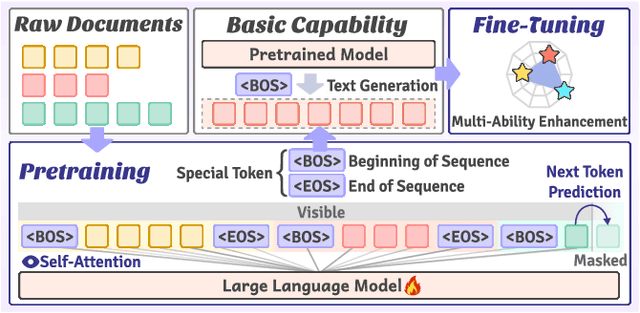



Abstract:Large-scale pretrained models, particularly Large Language Models (LLMs), have exhibited remarkable capabilities in handling multiple tasks across domains due to their emergent properties. These capabilities are further augmented during the Supervised Fine-Tuning (SFT) phase. Despite their potential, existing work mainly focuses on domain-specific enhancements during fine-tuning, the challenge of which lies in catastrophic forgetting of knowledge across other domains. In this study, we introduce VersaTune, a novel data composition framework designed for enhancing LLMs' overall multi-ability performances during training. We categorize knowledge into distinct domains including law, medicine, finance, science, code, etc. We begin with detecting the distribution of domain-specific knowledge within the base model, followed by the training data composition that aligns with the model's existing knowledge distribution. During the training process, domain weights are dynamically adjusted based on their learnable potential and forgetting degree. Experimental results demonstrate that VersaTune achieves significant improvements in multi-domain performance, with an 35.21% enhancement in comprehensive multi-domain tasks. Additionally, in scenarios where specific domain optimization is required, VersaTune reduces the degradation of performance in other domains by 38.77%, without compromising the target domain's training efficacy.
VersaTune: Harnessing Vertical Domain Insights for Multi-Ability LLM Supervised Fine-Tuning
Nov 24, 2024



Abstract:Large Language Models (LLMs) exhibit remarkable capabilities in handling multiple tasks across domains due to their emergent properties. These capabilities are further augmented during the Supervised Fine-Tuning (SFT) phase. Despite their potential, existing work mainly focuses on domain-specific enhancements during fine-tuning, the challenge of which lies in catastrophic forgetting of knowledge across other domains. In this study, we introduce VersaTune, a novel data composition framework designed for enhancing LLMs' overall multi-ability performances during fine-tuning. We categorize knowledge into distinct domains including law, medicine, finance, science, code. We begin with detecting the distribution of domain-specific knowledge within the base model, followed by the composition of training data that aligns with the model's existing knowledge distribution. During the fine-tuning process, weights of different domains are dynamically adjusted based on their learnable potential and forgetting degree. Experimental results demonstrate that VersaTune achieves significant improvements in multi-domain performance, with a 35.21% enhancement in comprehensive multi-domain tasks. Additionally, in scenarios where specific domain optimization is required, VersaTune reduces the degradation of performance in other domains by 38.77%, without compromising the target domain's training efficacy.
VersaTune: Fine-Tuning Multi-Ability LLMs Efficiently
Nov 18, 2024



Abstract:Large Language Models (LLMs) exhibit remarkable capabilities in handling multiple tasks across domains due to their emergent properties. These capabilities are further augmented during the Supervised Fine-Tuning (SFT) phase. Despite their potential, existing work mainly focuses on domain-specific enhancements during fine-tuning, the challenge of which lies in catastrophic forgetting of knowledge across other domains. In this study, we introduce VersaTune, a novel data composition framework designed for enhancing LLMs' overall multi-ability performances during fine-tuning. We categorize knowledge into distinct domains including law, medicine, finance, science, code. We begin with detecting the distribution of domain-specific knowledge within the base model, followed by the composition of training data that aligns with the model's existing knowledge distribution. During the fine-tuning process, weights of different domains are dynamically adjusted based on their learnable potential and forgetting degree. Experimental results demonstrate that VersaTune achieves significant improvements in multi-domain performance, with a 35.21% enhancement in comprehensive multi-domain tasks. Additionally, in scenarios where specific domain optimization is required, VersaTune reduces the degradation of performance in other domains by 38.77%, without compromising the target domain's training efficacy.
Baichuan-Omni Technical Report
Oct 11, 2024



Abstract:The salient multimodal capabilities and interactive experience of GPT-4o highlight its critical role in practical applications, yet it lacks a high-performing open-source counterpart. In this paper, we introduce Baichuan-Omni, the first open-source 7B Multimodal Large Language Model (MLLM) adept at concurrently processing and analyzing modalities of image, video, audio, and text, while delivering an advanced multimodal interactive experience and strong performance. We propose an effective multimodal training schema starting with 7B model and proceeding through two stages of multimodal alignment and multitask fine-tuning across audio, image, video, and text modal. This approach equips the language model with the ability to handle visual and audio data effectively. Demonstrating strong performance across various omni-modal and multimodal benchmarks, we aim for this contribution to serve as a competitive baseline for the open-source community in advancing multimodal understanding and real-time interaction.
DataSculpt: Crafting Data Landscapes for LLM Post-Training through Multi-objective Partitioning
Sep 02, 2024


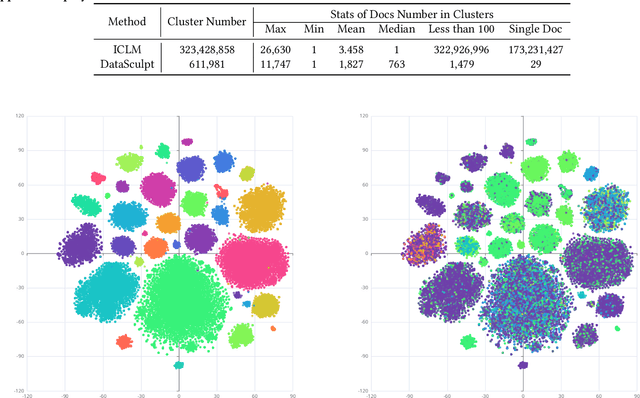
Abstract:The effectiveness of long-context modeling is important for Large Language Models (LLMs) in various applications. Despite their potential, LLMs' efficacy in processing long context does not consistently meet expectations, posing significant challenges for efficient management of prolonged sequences in training. This difficulty is compounded by the scarcity of comprehensive and diverse training datasets suitable for long sequences, which stems from inherent length biases across different data sources, and the logistical complexities associated with massive data management for training in extended contexts. In this work, we introduce DataSculpt, a data construction framework designed to strategically augment the data architecture for extended-context training. Our thorough evaluations demonstrate DataSculpt's remarkable capacity to boost long-context training performance, achieving improvements including an 18.09% increase in retrieval augmentation, 21.23% in summarization, 21.27% in reading comprehension, and a 3.81% rise in code completion, all while preserving the models' overall proficiency with a 4.88% improvement.
BaichuanSEED: Sharing the Potential of ExtensivE Data Collection and Deduplication by Introducing a Competitive Large Language Model Baseline
Aug 27, 2024


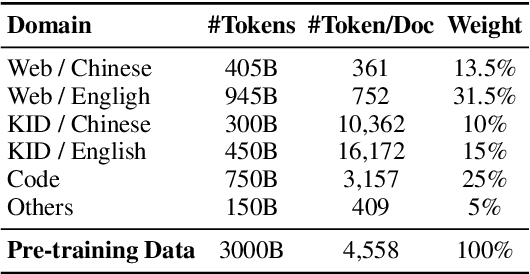
Abstract:The general capabilities of Large Language Models (LLM) highly rely on the composition and selection on extensive pretraining datasets, treated as commercial secrets by several institutions. To mitigate this issue, we open-source the details of a universally applicable data processing pipeline and validate its effectiveness and potential by introducing a competitive LLM baseline. Specifically, the data processing pipeline consists of broad collection to scale up and reweighting to improve quality. We then pretrain a 7B model BaichuanSEED with 3T tokens processed by our pipeline without any deliberate downstream task-related optimization, followed by an easy but effective supervised fine-tuning stage. BaichuanSEED demonstrates consistency and predictability throughout training and achieves comparable performance on comprehensive benchmarks with several commercial advanced large language models, such as Qwen1.5 and Llama3. We also conduct several heuristic experiments to discuss the potential for further optimization of downstream tasks, such as mathematics and coding.
Event-driven Real-time Retrieval in Web Search
Dec 04, 2023Abstract:Information retrieval in real-time search presents unique challenges distinct from those encountered in classical web search. These challenges are particularly pronounced due to the rapid change of user search intent, which is influenced by the occurrence and evolution of breaking news events, such as earthquakes, elections, and wars. Previous dense retrieval methods, which primarily focused on static semantic representation, lack the capacity to capture immediate search intent, leading to inferior performance in retrieving the most recent event-related documents in time-sensitive scenarios. To address this issue, this paper expands the query with event information that represents real-time search intent. The Event information is then integrated with the query through a cross-attention mechanism, resulting in a time-context query representation. We further enhance the model's capacity for event representation through multi-task training. Since publicly available datasets such as MS-MARCO do not contain any event information on the query side and have few time-sensitive queries, we design an automatic data collection and annotation pipeline to address this issue, which includes ModelZoo-based Coarse Annotation and LLM-driven Fine Annotation processes. In addition, we share the training tricks such as two-stage training and hard negative sampling. Finally, we conduct a set of offline experiments on a million-scale production dataset to evaluate our approach and deploy an A/B testing in a real online system to verify the performance. Extensive experimental results demonstrate that our proposed approach significantly outperforms existing state-of-the-art baseline methods.
 Add to Chrome
Add to Chrome Add to Firefox
Add to Firefox Add to Edge
Add to Edge